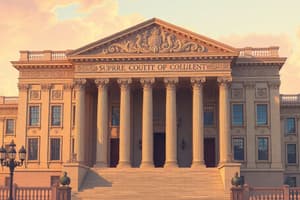Podcast
Questions and Answers
What was established by the Judiciary Act of 1789?
What was established by the Judiciary Act of 1789?
- The doctrine of implied powers
- The concept of contractual rights
- The Supreme Court with six justices (correct)
- The principle of judicial review
What was the significance of the Marbury v. Madison case in 1803?
What was the significance of the Marbury v. Madison case in 1803?
- It established the principle of tribal sovereignty
- It established the concept of contractual rights
- It established the principle of judicial review (correct)
- It established the doctrine of implied powers
What was the significance of the McCulloch v. Maryland case in 1819?
What was the significance of the McCulloch v. Maryland case in 1819?
- It established the concept of contractual rights
- It established the doctrine of implied powers (correct)
- It established the principle of judicial review
- It established the principle of tribal sovereignty
What was the significance of the Dartmouth College v. Woodward case in 1819?
What was the significance of the Dartmouth College v. Woodward case in 1819?
What was the significance of the Worcester v. Georgia case in 1832?
What was the significance of the Worcester v. Georgia case in 1832?
What was the significance of the Chisholm v. Georgia case in 1793?
What was the significance of the Chisholm v. Georgia case in 1793?
What is the significance of these early American decisions?
What is the significance of these early American decisions?
How many justices were established by the Judiciary Act of 1789?
How many justices were established by the Judiciary Act of 1789?
What office was created by the Judiciary Act of 1789?
What office was created by the Judiciary Act of 1789?
Flashcards are hidden until you start studying
Study Notes
Early American Decisions
Judiciary Act of 1789
- Established the Supreme Court with six justices
- Defined the Court's jurisdiction and powers
- Created the office of the Attorney General
Marbury v. Madison (1803)
- First significant Supreme Court case
- Established the principle of judicial review
- Gave the Supreme Court the power to declare laws unconstitutional
McCulloch v. Maryland (1819)
- Established the doctrine of implied powers
- Ruled that the federal government has implied powers beyond those explicitly stated in the Constitution
- Affirmed the supremacy of federal law over state law
Dartmouth College v. Woodward (1819)
- Established the concept of contractual rights
- Ruled that the state of New Hampshire could not alter the charter of Dartmouth College
- Protected the rights of private institutions from state interference
Worcester v. Georgia (1832)
- Established the principle of tribal sovereignty
- Ruled that the state of Georgia could not enforce its laws on Cherokee Indian lands
- Affirmed the rights of Native American tribes to self-governance
Chisholm v. Georgia (1793)
- Established the principle of state sovereignty
- Ruled that a state could not be sued by a citizen of another state
- Later overturned by the 11th Amendment
These early American decisions set important precedents for the development of American law and government, shaping the balance of power between the federal government, states, and individual rights.
Early American Decisions
Judiciary Act of 1789
- Established the Supreme Court with six justices, defining the Court's jurisdiction and powers
- Created the office of the Attorney General, solidifying the federal government's legal structure
Marbury v.Madison (1803)
- First significant Supreme Court case, establishing the principle of judicial review
- Gave the Supreme Court the power to declare laws unconstitutional, a cornerstone of American democracy
McCulloch v.Maryland (1819)
- Established the doctrine of implied powers, broadening the federal government's authority
- Ruled that the federal government has implied powers beyond those explicitly stated in the Constitution, expanding federal power
- Affirmed the supremacy of federal law over state law, clarifying the relationship between federal and state governments
Dartmouth College v.Woodward (1819)
- Established the concept of contractual rights, protecting private institutions from state interference
- Ruled that the state of New Hampshire could not alter the charter of Dartmouth College, upholding the rights of private entities
- Protected the autonomy of private institutions, ensuring their independence from state control
Worcester v.Georgia (1832)
- Established the principle of tribal sovereignty, recognizing the rights of Native American tribes to self-governance
- Ruled that the state of Georgia could not enforce its laws on Cherokee Indian lands, affirming tribal autonomy
- Affirmed the rights of Native American tribes to govern themselves, free from state interference
Chisholm v.Georgia (1793)
- Established the principle of state sovereignty, limiting the ability of citizens to sue states
- Ruled that a state could not be sued by a citizen of another state, protecting state sovereignty
- Later overturned by the 11th Amendment, which further solidified state immunity
Studying That Suits You
Use AI to generate personalized quizzes and flashcards to suit your learning preferences.




